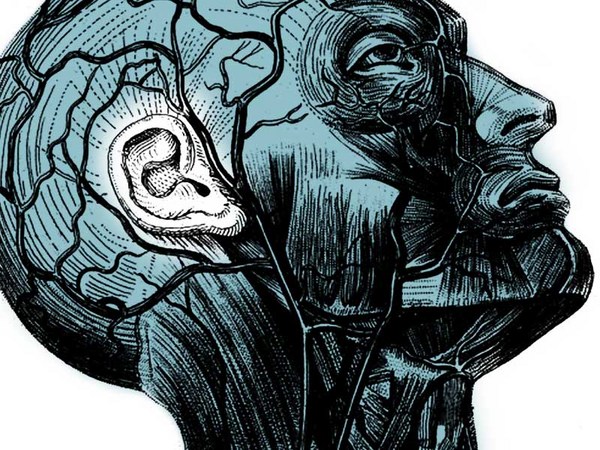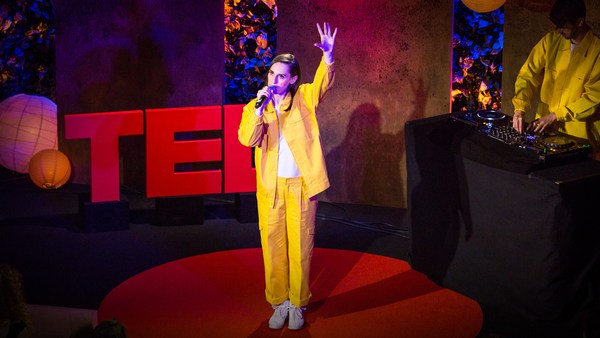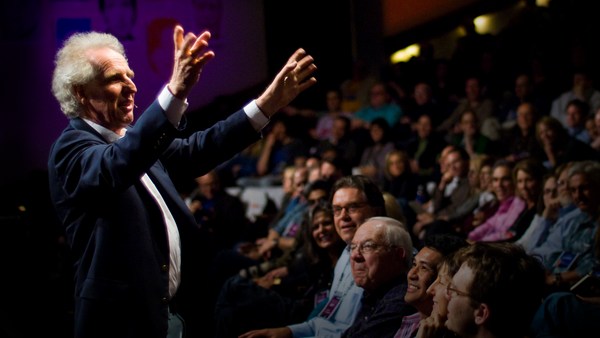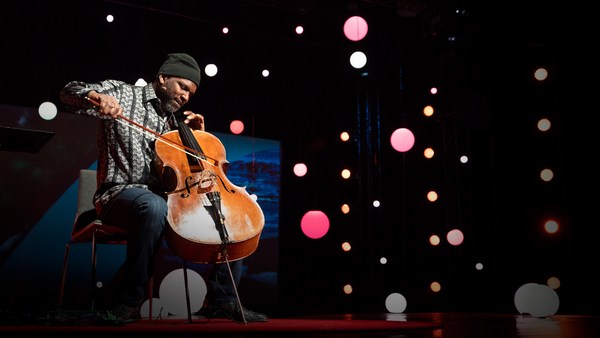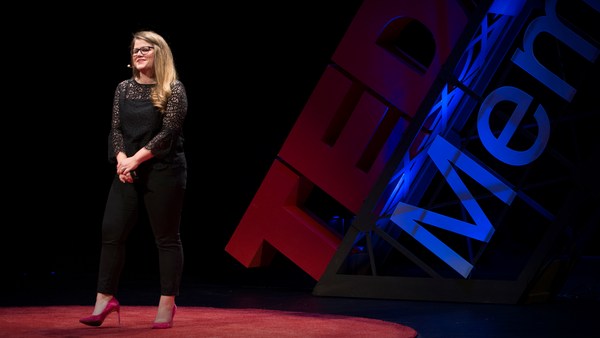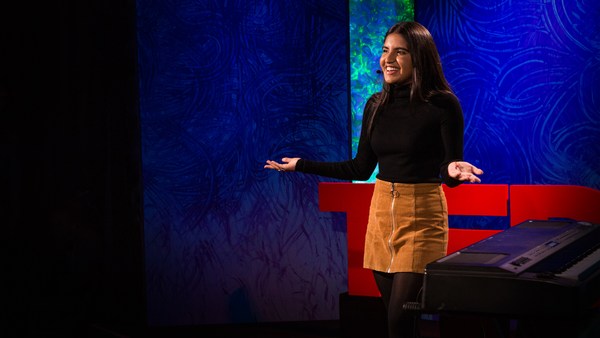Amber Galloway-Gallego: OK, hi. I'm a sign-language interpreter that specializes in music interpreting. And you're probably wondering why Deaf people would attend concerts, but actually, music is so much more than sound simply traveling through the ear. See, Deaf people experience music, just in a different way. For example, my friend Lisa, she cuts her hair a certain length, so she feels the vibrations of sound in the music. And music has psychological effects on us. It invokes feelings of nostalgia, happiness, sadness, falling in love. It makes you have a feeling of connectedness, and unfortunately, Deaf and hard-of-hearing people are excluded from these events, because obtaining a sign-language interpreter is so difficult and so overwhelming that they simply don't buy the tickets or they just give up, and this is not OK. We have to make everything accessible.
So, myself, I am a sign-language interpreter, so what I have to do is I have to take music and bring it to life. In doing that, I become a bridge between the hearing world and the Deaf world, making sure that I'm representing music and the artistry of what music represents. Now, this is a lot of work, OK? For a regular set that might be 12 songs, myself and a team, we have to study over 30 songs or more for one set and hope and pray we have the right setlist.
But you know what? You know what the reward is? Looking down in the audience and seeing Deaf and hard-of-hearing members, all of those people dancing and jamming out and feeling included in that music experience. For myself, I'm a part of this cultural and linguistic community, and we all communicate in different ways. Some of us sign and voice, some of us just sign, but no one way is superior to the other.
But you know what? Those with hearing loss face daily battles to communication access, and those barriers are put up daily for them. And music shouldn't be one of them. So along with Madame Gandhi and myself today, let's break down those barriers.
(Applause and cheers)
(Music: "Top Knot Turn Up")
(Percussion)
Madame Gandhi: This is a song about getting the work done.
Hair up in a bun that's the most fun.
Hearing myself think when I go for a run
or maybe I'm practicing the drums
or maybe I'm writing in the sun,
the takeaway point is I'm talking to no one.
Protecting my vibes that are wholesome,
trying my best to solve actual problems.
If you want to hang with me
then you have to roll up your sleeves and work with me.
This ain't no time to come flirt with me;
pipelines and drills are destroying the earth, you see.
I cannot stand all the constant misogyny.
Tie my hair back so there ain't nothing stopping me.
Top knot turn up. It's a top knot turn up.
Top knot turn up, turn up, turn up --
about getting the work done.
Top knot turn up, turn up, turn up.
It's a top knot turn up.
Top knot turn up, eh.
(Percussion)
Tie up and tie up your hair
and throw back those curls.
So tie up and tie up and tie up your hair
and throw back those curls, uh ...
Throw back those curls,
throw back and throw back and throw back those curls, uh ...
(Beatboxing)
(Percussion and beatboxing)
I turned off my phone's notifications,
so I have more time.
No bubbles to trouble my clear state of mind.
One thing to know, I'm not here to please.
Hair tied back, I do it properly.
My time is not your property
when I'm productive like my ovaries.
Eh, give a grown girl room to breathe, basic rights and her liberty.
Free from insecurity that the world's projecting onto me.
Please do not trouble me when I am focused.
The future is female, you already know this.
I'm fighting against the corruption on SCOTUS,
upping my top knot since when I first wrote this.
Eh ...
It's a top knot turn up.
Top knot turn up, turn up, turn up --
about getting the work done.
Top knot turn up, turn up, turn up.
It's a top knot turn up.
Top knot turn up, ay.
(Percussion)
Tie up and tie up and tie up your hair,
throw back those curls.
Tie up and tie up your hair,
throw back those curls, uh ...
Throw back those curls,
throw back and throw back and throw back those curls.
(Beatboxing)
Amber G.
(Applause and cheers)
Top knot turn up.
(Music and applause)
Madame Gandhi.
(Music)
(Applause and cheers)
(Music ends)
(Applause and cheers)
Amber, it's such a pleasure to share this stage with you, and to make my music accessible to an audience who might be hard of hearing or Deaf and otherwise might not be able to be included in my music. And it really wasn't until this collaboration that I had thought of the fact that though I work so much in diversity and inclusion, that my music may not be reaching as many people as it could be.
I grew up in New York City, playing the drums, listening to Nas, Lauryn Hill, Thievery Corporation, TV on the Radio, the Spice Girls --
And for me, music was truth. Music was my perspective into somebody else's point of view, into storytelling, into understanding how the world works. And yet at the same time, I felt like there was such a disconnect between the way that I understood my own very multidimensional sense of my gender identity and the very two-dimensional way that women and femmes were often portrayed in the media.
(Sighs)
As I moved through my life, I went on to study mathematics and women's studies at Georgetown. I was the first-ever data analyst at Interscope Records. I toured the world playing the drums for M.I.A. And I did my MBA at Harvard, all with the intention of being able to make a difference in the music industry and move the needle on gender equality from the business side. But it was only until three years ago, when I ran the London Marathon bleeding freely on my cycle to combat the global menstrual stigma that women face every day all around the world, that I realized that I have a message, and that the most effective way that I can convey my message was through my music.
And why music? Because music caters to the emotions. Music is joyful. Music pulls you in with the beat and the rhythm and the melodies. The music pulls you in via the community aspect of it. And music allows you to access somebody else's truth. In the music I listen to today, sometimes I'm like, wow, I love the rhythm so much, but the message is so misogynist, it's tough to work out to our run to or do whatever it is that I'm trying to do. I oftentimes say, "I'm not here trying to turn up to the sound of my own oppression." You feel me?
(Laughter and cheers)
So I'm here to build the alternative instead. In my work, I talk often about the notion that the future is female. That we can actually look to the femme archetype and derive alternative styles of leadership that might encourage, instead, collaboration, emotional intelligence and building a world that is linked and not ranked. And so for anyone watching or listening and experiencing this talk today, I encourage you to consider the blind spots in your work and what partnerships or collaborations you can do to be able to make your work have even greater of an impact.
This next song is called "Bad Habits," and it's about being an even better version of yourself.
(Percussion and beatboxing)
(Singing) I had run out of time,
I had done lost my mind,
I had run out of time,
I had done lost my mind.
I didn't know
why.
I didn't know.
I been so pressed that I don't even know
what's bothering me.
All my bad habits have go to, got to go
entirely.
It's my year to be free
from what's bothering me.
It's this society
that's killing me.
All my bad habits have got to, go to go.
All my bad habits have got to, got to go.
All my bad habits have got to, got to go.
Yeah.
All my bad habits have got to, got to go.
Turn with me.
(Beatboxing)
Ready?
Clap with me.
(Audience claps)
Now listen.
(Singing) Fela Kuti in the 1970s
inspires me.
All he wanted was his people to be free
from the colony,
like Mahatma Gandhi in the 1940s.
I've been reading about women's history
in the 1920s,
thinking about how I could be so much better.
Thinking about all the tears I've cried.
Thinking about how we could be so much better.
Thinking about all the tears we've cried.
(Percussion)
Yes.
All my bad habits have got to, got to go.
All my bad habits have got to, got to go.
All my bad habits have got to, got to go.
All my bad habits have got to, got to go.
All my bad habits have got to, got to go.
All my bad habits have got to, got to go.
All my bad habits have got to, got to go.
All my bad habits have got to, got to go.
(Music ends)
(Applause and cheers)
Thank you.
(Applause and cheers)
